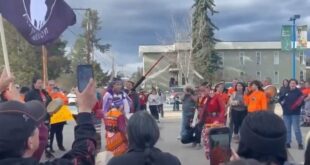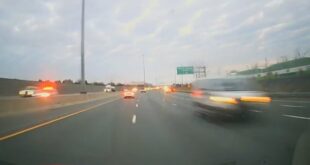Temporary injunction blocks start of law until March 31

A British Columbia Supreme Court Justice has granted a temporary injunction against the B.C. NDP government's legislation banning all drug use in a wide range of public spaces, pausing the law three days before it was set to come into force.
The B.C. Restricting Public Consumption of Illegal Substances Act passed in early November and was set to become law on Jan. 1. However it would not have immediately impacted people's lives because cabinet has not yet approved regulations to implement it.
The proposed changes would ban illegal substance use from all public parks to sports fields and beaches, as well as close to any workplaces, skate parks, pools, transit stops, residences or playgrounds — including within six metres of "a place to which the public has access" and "a prescribed place."
But on Friday, B.C. Supreme Court Chief Justice Christopher Hinkson ordered the law paused until March 31, ruling it would likely result in more deaths, displacement and criminalization of people who use drugs.
"Irreparable harm will be caused if the act comes into force," Hinkson wrote in his ruling, released Friday.
"… There is a high degree of probability that at least some of the harm set out by the plaintiff will in fact occur."
The injunction was sought in November by the Harm Reduction Nurses Association, a B.C.-based coalition of nurses and health-care professionals who argued the Act would result in more deaths from toxic drugs.
"Centrally, but not exclusively, the act will promote more lone drug use … particularly dangerous due to an absence or a diminished degree of support in the event of an overdose. When people are isolated and out of sight, they are at a much higher risk of dying," wrote Hinkson in his decision.
If implemented, the law would be the first major change to B.C.'s drug decriminalization pilot program — which removed grounds to arrest or charge people for personal possession of small amounts of some illicit drugs — since it began on Jan. 31.
Toxic, unregulated drugs killed at least 2,039 people in the province in the first 10 months of this year, according to the B.C. Coroners Service last month. That brings the total to 13,317 deaths since B.C. declared a public health emergency in 2016.
The HRNA said in a statement Friday that the act would "exacerbate many harms" to drug users, not only undermining efforts toward decriminalization, but endangering people's lives.
"The act would cause irreparable harm to people at risk of injury and death amid a public health crisis," the association said in a statement Friday.
"This proposed law would threaten the lives, health, and safety, and Charter rights of our clients, many of whom live in communities that lack safe, indoor locations where drug use is permitted."
Province reviewing options: health minister
B.C. Health Minister Adrian Dix said Friday the province will respect the decision and will "review the impact of this court decision and possible response by government in the coming days."
"In our view it takes away our ability to do what every other province does, which is to regulate where drugs can be used," he said at an unrelated media availability.
In a statement following the decision, B.C.'s public safety minister said the law was meant to protect families, children and "vulnerable community members," while also helping substance users.

Changes to B.C. drug decriminalization pilot fail to address resource issues, says mayor
3 months ago
Gladys Atrill, mayor of the Town of Smithers, tells BC Today host Michelle Eliot that municipalities lack the resources to protect public safety and to support the well-being of drug users.
"We're determined to keep doing everything we can to save lives in the face of the toxic drug crisis … while recognizing that hard drugs should not be used in public places frequented by children and families," Minister Mike Farnworth said.
Official opposition leader Kevin Falcon of B.C. United says the injunction is proof of B.C.'s "irresponsible" approach to decriminalization, which he once again called on the B.C. NDP to end on Friday.
Falcon says the pilot has been "a terrible mistake" and lacks proper "guardrails," which the ban on use in some areas would help address.
Friday's injunction "is certainly not good for communities struggling with the use of drugs taking place in parks, beaches and public spaces," he told CBC News.
Not enough safe places to use, says drug user
David Piggott, who lives in a tent in Vancouver's Oppenheimer Park, said Friday that his "biggest concern is kids," but he doesn't know where else he will be able to smoke his drugs if the law takes effect.
Piggott says he often smokes his drugs alone inside his tent because there aren't supervised inhalation sites near him in the Downtown Eastside, increasing his risk of overdosing.
"Where the hell am I supposed to go? Outside where I can get arrested? Or inside where no one can see me?" he said in an interview Friday.

Drug user advocate concerned over ban on drug use in more public spaces
3 months ago
On CBC's BC Today, Garth Mullins with the Vancouver Area Network of Drug Users said the proposed changes to the decriminalization pilot suggests the government is 'starting to back away' from the project.
Fiona Wilson, president of the B.C. Association of Chiefs of Police, says the organization is "disappointed" by Friday's decision and supports the legislation as it stands, as well as B.C.'s decriminalization pilot.
She says while most drug users go out of their way to avoid children, the ban targets those who don't.
"We are talking about those rare circumstances where that is not being respected and it's really important for our police officers to be able to address that kind of behaviour," said Wilson, who is also a deputy chief with Vancouver Police.
She says she hopes the revised legislation will "strike that balance between addressing problematic public consumption but also ensuring that people who use drugs in our communities are safe and are able to do so in places where they're not alone."
With files from David Ball, Meera Bains and Yvette Brend
*****
Credit belongs to : www.cbc.ca
 MaharlikaNews | Canada Leading Online Filipino Newspaper Portal The No. 1 most engaged information website for Filipino – Canadian in Canada. MaharlikaNews.com received almost a quarter a million visitors in 2020.
MaharlikaNews | Canada Leading Online Filipino Newspaper Portal The No. 1 most engaged information website for Filipino – Canadian in Canada. MaharlikaNews.com received almost a quarter a million visitors in 2020.







